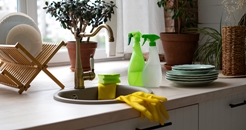 The health benefits of cleanliness and being organised
The health benefits of cleanliness and being organised
From an article in
Psychology Today
Keeping things clean and organized is good for you, and science can prove it.
A study led by associate professor Dr NiCole R. Keith at Indiana University, found that people with clean houses are healthier than people with messy houses. NiCole and her colleagues tracked the physical health of 998 African Americans between the ages of 49 and 65, a demographic known to be at an increased risk for heart disease. Participants who kept their homes clean were healthier and more active than those who didn’t. In fact, house cleanliness was even more of a predictor for physical health than neighbourhood walkability.
A 2010 study published in the scientific journal, Personality and Social Psychology Bulletin, used linguistic analysis software to measure the way 60 individuals discussed their homes. Women who described their living spaces as “cluttered” or full of “unfinished projects” were more likely to be depressed and fatigued than women who described their homes as “restful” and “restorative.” The researchers also found that women with cluttered homes expressed higher levels of the stress hormone, cortisol.
In 2011, researchers at Princeton University found that clutter can actually make it more difficult to focus on a particular task. Specifically, they found that the visual cortex can be overwhelmed by task-irrelevant objects, making it harder to allocate attention and complete tasks efficiently.
A survey conducted by the National Sleep Foundation found that people who make their beds every morning are 19 percent more likely to report regularly getting a good night’s sleep. People who were surveyed also reported benefits from having clean sheets — specifically, 75 percent of people said they get a better night’s rest when their sheets are freshly cleaned because they feel more comfortable.
Maintaining an organized schedule and a list of short-term goals can help you stay in shape. A study in the Journal of Obesity found that people who carefully plan their exercise regimen, set goals and regularly record their progress are more likely to keep up an exercise program than people who show up at the gym without a clear plan in mind.
What makes staying organized so difficult?
1. You have too much clutter.
The problem: As we go through life, we pick up little (or big) objects that we don’t necessarily need. These objects take up space that could be better used by other, more necessary items. Getting rid of clutter can be difficult, especially since we often attach emotional feelings to old objects. Try your best to donate or throw away your clutter. If you’re afraid to let certain things go, try taking photographs of them so that you’ll always have a physical reminder. You might also find new places to store these objects as your house becomes more organized.
2. You don’t have enough time.
Organizing just one room takes a lot of time. When faced with the prospect of organizing your entire home, you might be tempted to give up before you start. How are you supposed to keep up with your career, your family, and your hobbies if you’re spending all of your time cleaning? Unfortunately, when your home is disorganized, you work less efficiently, giving you even less free time. It can become a vicious cycle. As with any daunting project, take things one step at a time. Spend 30 minutes a day on cleaning and organization. If you don’t have time for that, try 15 minutes. If you don’t have time for that, try 10 minutes.
3. You forget how nice it feels to be organized.
Few things are more satisfying than entering a perfectly clean home. Unfortunately, once your house is clean, it becomes easier to slip into bad habits. Soon enough, your home will be just as disorganized as before. Remember, spending the time and effort to keep your space clean is well worth it.
It’s clear that staying clean and organized is a good thing. It helps us feel better about ourselves, it keeps us productive and it may very well keep us physically fit. The next time we bemoan having to clean our home, let’s try to keep these things in mind. We’ll feel much better when everything is organized.
Given the reported heightened mental health concerns caused by the lockdown and pandemic, I thought this article might help. Besides, I can just imagine some parents reading parts of this to their teenagers!
Retweet about this article:
From an article in Psychology Today, 24/11/2020